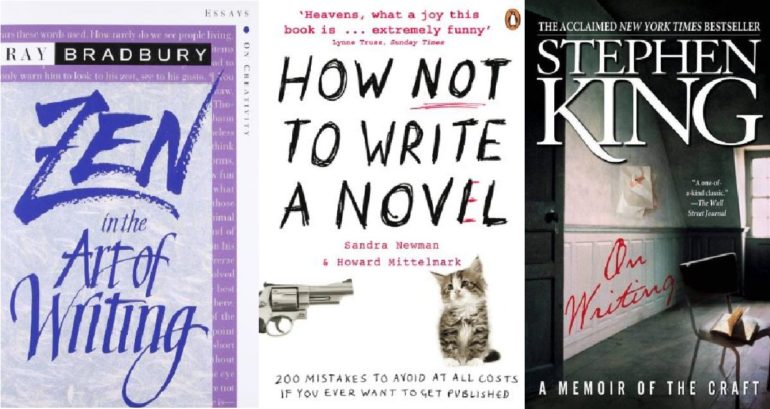How is your writing going at the moment? I’ll be honest and say that mine personally could have been better this last month or so. I started the year strongly and have reached a bit of a dip. The thing that always helps me to get out of a slump is to get inspired by someone else, be it asking a friend who is busy with their words if I can read for them, or reading a book about writing by someone who seriously knows what they are talking about. Here are three great books on the subject, all of which have helped me when I’ve been feeling a bit down in the writing dumps. They’re the ones I always go back to time and again, whenever I need that jolt.
1. Zen in the Art of Writing – Ray Bradbury
Writing is supposed to be difficult, agonizing, a dreadful exercise, a terrible occupation.
This is a book I was assigned on my MA, and I’m always flicking through the pages. Ray Bradbury wrote something like 30 books and 500 short stories, as well as scripts, essays and countless other things. If anyone knows about writing, it is him.
Zen in the Art of Writing is a book full of excellent and helpful tips. I like his thoughts on developing ideas and your own style the best, but what I really love about it is that Bradbury is so honest about the actual craft of writing. He doesn’t ever pretend that it is an easy thing to do, but he is also far from discouraging. Reading the book, you get the feeling that Bradbury believes in you, whoever you are, whenever you are reading his book – he believes you can be a writer just like him. Sometimes that is all the encouragement you need to get going through a difficult patch.
2. On Writing: A Memoir of the Craft – Stephen King
So okay― there you are in your room with the shade down and the door shut and the plug pulled out of the base of the telephone. You’ve blown up your TV and committed yourself to a thousand words a day, come hell or high water. Now comes the big question: What are you going to write about? And the equally big answer: Anything you damn well want.
You’ve heard of Stephen King, right? I don’t need to introduce him. On Writing is another book I was assigned on my MA, and another one I am profoundly grateful for. Everyone who wants to be a writer should read this book. I almost don’t need to say more than that.
On Writing is, as the full title suggests, more than just a book about writing. It is a book about the life that comes with writing, and how those things can rub along together, and how sometimes they can’t. King is painfully honest about everything, from his struggle with alcohol and drugs, to the sheer number of rejections he received when he first started writing, to slowly coming back to his writing after an accident that almost killed him. What I like about this book is that King is just a guy who happens to be one of the world’s best-selling authors, and he doesn’t pretend there is any mysticism to being so successful. He just puts himself in a chair every day and he writes, and that is no different for him than it is for any of us.
3. How Not to Write a Novel – Howard Mittelmark and Sandra Newman
There was a time when a book could be sold purely because its author had been to distant climes and had returned to tell of the exotic sights he had seen. That author was Marco Polo, and the time was the thirteenth century.
You might not have heard of husband and wife team Mittelmark and Newman, but you’re definitely going to want to get hold of their book. Both of them are authors in their own right – not as famous as Stephen King, of course – but more than qualified to dole out the advice.
And what I love about their advice is that is so funny. Their book is an actual joy to read, in a way that not many ‘self help’ books are, and you come away as entertained as you do informed. The gimmick is that this book is ‘how not to write a novel’, so they focus on all of the things that can go horribly wrong when creating your masterpiece, rather than telling you directly how to get it right. Funny as it is though, don’t think that you’ve been short changed on the advice – the first time that I read it, I came away from this book with thoughts for days on everything I needed to work on.
READ NEXT: 15 Best Horror Books You Should Read (If You Dare)
Some of the coverage you find on Cultured Vultures contains affiliate links, which provide us with small commissions based on purchases made from visiting our site.

